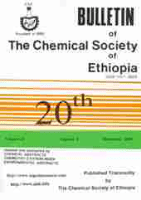
BULLETIN OF THE CHEMICAL SOCIETY OF ETHIOPIA
Scope & Guideline
Fostering Collaborative Chemistry for a Sustainable Future
Introduction
Aims and Scopes
- Chemical Synthesis and Characterization:
Research articles often detail the synthesis of novel chemical compounds, including organic and inorganic materials, and their characterization using various spectroscopic and analytical techniques. - Biological and Medicinal Chemistry:
The journal highlights studies that investigate the biological activities of synthesized compounds, including their potential as pharmaceuticals, antibacterial agents, and antioxidant properties. - Environmental Chemistry and Sustainability:
Papers addressing environmental issues, such as pollution remediation, the use of natural materials for wastewater treatment, and the impact of chemicals on ecosystems are prevalent. - Nanotechnology and Material Science:
The journal covers research on nanomaterials, their synthesis, characterization, and applications, especially in catalysis, sensors, and environmental remediation. - Theoretical and Computational Chemistry:
Numerous studies employ computational methods to predict molecular behavior, stability, and interactions, contributing to the understanding of chemical phenomena at the molecular level.
Trending and Emerging
- Green Chemistry and Sustainable Practices:
There is a marked increase in research focusing on green chemistry methods, including eco-friendly synthesis processes, waste minimization, and sustainable materials, reflecting the global push towards sustainability. - Nanomaterials and Their Applications:
Research related to the synthesis and application of nanomaterials has surged, particularly in areas such as catalysis, drug delivery, and environmental remediation, highlighting their versatility and potential. - Bioinorganic and Medicinal Chemistry:
The exploration of metal complexes and their biological activities, particularly as anticancer and antibacterial agents, is gaining traction, showcasing the intersection of inorganic chemistry with medicinal applications. - Computational and Theoretical Chemistry:
An increasing number of studies utilize computational methods to predict molecular behavior, enhancing the understanding of chemical interactions and guiding experimental designs. - Biotechnology and Biomaterials:
Research focusing on the use of biological materials and processes in chemical applications, including biosensors and bioremediation, is emerging as a significant area of interest.
Declining or Waning
- Traditional Organic Synthesis Methods:
Research focusing on conventional organic synthesis techniques is becoming less common, with a noticeable shift towards greener and more efficient methods, including biocatalysis and solvent-free reactions. - Basic Analytical Chemistry:
While analytical chemistry remains important, the focus on basic analytical methods without advanced applications or theoretical backing has diminished, as researchers seek more sophisticated or integrated approaches. - Inorganic Chemistry without Biological Relevance:
Studies on inorganic compounds that do not have a direct application in biological systems or environmental contexts are becoming less frequent, as the journal increasingly prioritizes research with clear relevance to health or sustainability.
Similar Journals

CHEMICAL JOURNAL OF CHINESE UNIVERSITIES-CHINESE
Connecting Theoretical Insights with Practical Applications.CHEMICAL JOURNAL OF CHINESE UNIVERSITIES-CHINESE, published by Higher Education Press, serves as a vital platform for advancing research in the field of chemistry. With a history dating back to 1996, this journal has evolved to encompass a wide range of topics fundamental to the chemistry community, catering to both applied and theoretical perspectives. Although classified in Quartile 4 within the broader chemistry category, it remains a significant contributor to the knowledge base, ranking 281st out of 408 journals in the general chemistry category according to Scopus. Positioned in Beijing, China, the journal aims to foster collaboration among researchers and professionals while disseminating innovative research and developments. By promoting open exchange of ideas in chemistry, it strives to elevate the scholarly dialogue and contribute to ongoing education for students and professionals alike, with its content accessible through institutional subscriptions.
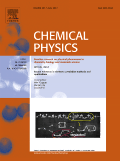
CHEMICAL PHYSICS
Fostering Collaboration in Cutting-Edge Chemical Physics.CHEMICAL PHYSICS is a premier international journal published by Elsevier, dedicated to advancing the field of theoretical and experimental chemistry, particularly within the physical domain. Since its inception in 1973, this journal has served as a platform for disseminating cutting-edge research, fostering collaboration among researchers and professionals in the community. With a notable impact factor and recognized in the Scopus rankings, CHEMICAL PHYSICS holds esteemed positions in two categories: Q3 in Physical and Theoretical Chemistry and Q2 in Physics and Astronomy (miscellaneous). Published in the Netherlands, the journal features high-quality articles that cover a broad spectrum of topics, aiming to deepen understanding of chemical phenomena through innovative approaches. Although open access options are not currently available, the journal remains invaluable for researchers, students, and professionals seeking to stay informed about the latest developments in chemical physics. With convergence years extending from 1973 to 2025, CHEMICAL PHYSICS continues to be a significant contributor to the academic discourse in its field.
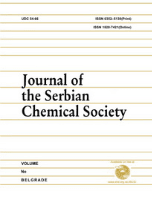
JOURNAL OF THE SERBIAN CHEMICAL SOCIETY
Advancing Chemistry Through Global CollaborationJOURNAL OF THE SERBIAN CHEMICAL SOCIETY, an esteemed publication in the field of chemistry, is published by the SERBIAN CHEMICAL SOCIETY and has been an essential platform for the dissemination of research since 1930. With an ISSN of 0352-5139, this Open Access journal is dedicated to fostering communication and collaboration among chemists worldwide, making its contents readily accessible to researchers, professionals, and students alike. Based in Serbia, the journal features a wide range of topics within the domain of general chemistry, as reflected in its Scopus rankings, which place it in the 34th percentile among its peers. The journal's engagement with the global scholarly community is further underscored by its consistent publication history since 1985, with coverage extending through to 2024. As the journal continues to evolve, it remains committed to promoting high-quality research and advancing the field of chemistry.

Chemical Methodologies
Connecting Scholars to Transform Chemical KnowledgeWelcome to Chemical Methodologies, a premier journal published by SAMI PUBLISHING CO-SPC, dedicated to advancing the field of chemistry through innovative research and methodologies. With an ISSN of 2645-7776 and an E-ISSN of 2588-4344, this journal provides a vital platform for researchers and scholars to share their findings in areas encompassing physical, theoretical, and organic chemistry. Despite its initial HIndex and quartile rankings still being established, the journal's evolving impact within the academic landscape is underscored by its Scopus Ranks, which place it in the 35th percentile for physical and theoretical chemistry and the 33rd percentile for organic chemistry. Since its inception in 2022, and continuing through 2024, Chemical Methodologies aims to foster collaboration and knowledge dissemination among academics and practitioners alike, bridging theoretical concepts and practical applications. This open-access platform enhances accessibility for researchers and students worldwide, ensuring that groundbreaking contributions to chemical science reach a broad audience.

JOURNAL OF THE CHEMICAL SOCIETY OF PAKISTAN
Empowering Researchers, Transforming Chemistry.JOURNAL OF THE CHEMICAL SOCIETY OF PAKISTAN is a premier academic journal published by the Chemical Society of Pakistan, focusing on advancing the field of chemistry through rigorous research and scholarship. Established in 1996, this journal aims to disseminate high-quality research articles, reviews, and insights pertaining to various subfields of chemistry, making substantial contributions to both local and international scientific communities. With a current impact factor placing it in the Q4 category, the journal continues to foster discussions on emerging trends and innovations within the discipline. Additionally, it holds a Scopus rank of #305 out of 408, highlighting its growing influence despite being positioned in the 25th percentile. Although it is not an open-access journal, it provides a crucial platform for researchers and professionals in Pakistan and worldwide. The JOURNAL OF THE CHEMICAL SOCIETY OF PAKISTAN serves as a valuable resource for students, educators, and industry professionals alike, facilitating the exchange of knowledge and promoting advancements in chemical sciences.

Journal of the Mexican Chemical Society
Catalyzing Collaboration in the Global Chemical CommunityWelcome to the Journal of the Mexican Chemical Society, an essential publication for researchers and professionals in the field of chemistry. Published by the reputable SOC QUIMICA MEXICO, this journal has been a vital platform for sharing innovative research and developments in the field since its inception in 2008. With an ISSN of 1870-249X and an E-ISSN of 1665-9686, the journal provides valuable insights and contributes to the global scientific community. As of 2023, it holds a Q3 quartile ranking in miscellaneous chemistry categories and ranks #258 out of 408 in General Chemistry on Scopus, placing it at the 36th percentile among its peers. Although currently not an open access journal, it remains committed to disseminating high-quality research that supports advancements in chemical education, practice, and technology. Researchers, academics, and students are encouraged to engage with this journal to explore groundbreaking studies and enhance their understanding of diverse chemical disciplines.
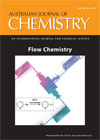
AUSTRALIAN JOURNAL OF CHEMISTRY
Pioneering discoveries in diverse chemical disciplines.The Australian Journal of Chemistry, with an ISSN of 0004-9425 and an E-ISSN of 1445-0038, is a distinguished publication from CSIRO PUBLISHING, dedicated to advancing the field of chemistry since its inception in 1948. Based in Australia, this journal serves as a platform for original research articles, reviews, and innovative studies that encompass a wide spectrum of chemical disciplines, aiming to foster communication and collaboration among researchers globally. Despite its Q3 ranking in the Chemistry (Miscellaneous) category and standing at rank #236 in Scopus’ general chemistry classification, it remains an essential resource for professionals and students seeking to stay informed about emerging trends and discoveries in chemistry. The journal does not offer open access, emphasizing the premium quality of peer-reviewed content that adheres to rigorous academic standards. By bridging theory and practice, the Australian Journal of Chemistry continues to play a crucial role in shaping the future of chemical sciences.

ACTA CHIMICA SLOVENICA
Empowering Discoveries in the Heart of SloveniaACTA CHIMICA SLOVENICA is a distinguished peer-reviewed journal dedicated to advancing the field of chemistry, published by the SLOVENSKO KEMIJSKO DRUSTVO. With an ISSN of 1318-0207 and E-ISSN 1580-3155, this journal has been an essential resource for researchers and professionals since its inception in 1996. Recognized for its commitment to open access since 1998, it fosters global collaboration by making research widely available. Based in Slovenia, the journal operates with a focus on various domains within chemistry, achieving a respectable Q3 ranking in 2023 within the miscellaneous chemistry category on Scopus, showcasing its impact and relevance. This journal serves as a vital platform for innovative research, reviews, and discoveries, aiming to enhance knowledge and ignite curiosity in a diverse readership, including students and emerging scholars in the field.
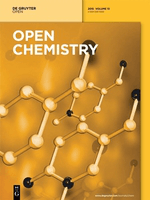
Open Chemistry
Catalyzing Progress in Chemistry and Materials ScienceOpen Chemistry, published by DE GRUYTER POLAND SP Z O O, is a distinguished peer-reviewed journal that has been serving the global chemistry community since its inception. With an ISSN of 2391-5420 and an E-ISSN also of 2391-5420, this open-access journal has been accessible to researchers and practitioners alike since 2015, ensuring a wide dissemination of high-quality research findings. Located in Germany, specifically at BOGUMILA ZUGA 32A STR, 01-811 WARSAW, MAZOVIA, POLAND, Open Chemistry aims to publish innovative research across various chemical disciplines, with special attention to miscellaneous chemistry and materials chemistry. It is currently ranked in the Q3 category for both fields as of 2023, reflecting its solid standing within the academic community, with specific ranks of 187/408 in General Chemistry and 153/317 in Materials Chemistry, corresponding to respective percentiles of 54 and 51. Open Chemistry not only enhances the accessibility of cutting-edge research but also serves as a vital resource for students, professionals, and scholars seeking to advance their knowledge in the rapidly evolving landscape of chemical sciences.

Izvestiya Vysshikh Uchebnykh Zavedenii Khimiya i Khimicheskaya Tekhnologiya
Fostering Collaboration in Chemical SciencesIzvestiya Vysshikh Uchebnykh Zavedenii Khimiya i Khimicheskaya Tekhnologiya is a prominent academic journal dedicated to the fields of chemistry and chemical technology, published by the esteemed IVANOVSKOGO KHIMIKO-TEKHNOLOGI TSHESKOGO INST in the Russian Federation. With an ISSN of 0579-2991 and E-ISSN of 2500-3070, this journal has been a crucial platform since its inception in 1980, showcasing significant advancements and research findings, particularly in its converged periods from 1980, 1982, and 2017 to 2024. The journal is ranked Q3 in Chemical Engineering and Chemistry, reflecting its dedication to quality scholarship. Although open access options are currently unavailable, the journal plays a vital role in disseminating knowledge and fostering collaboration among researchers, professionals, and students in these critical scientific domains. Situated in Ivanovo, Russia, it continues to be a focal point for impactful research, making it an essential resource for those aiming to stay at the forefront of innovation in chemistry and chemical engineering.